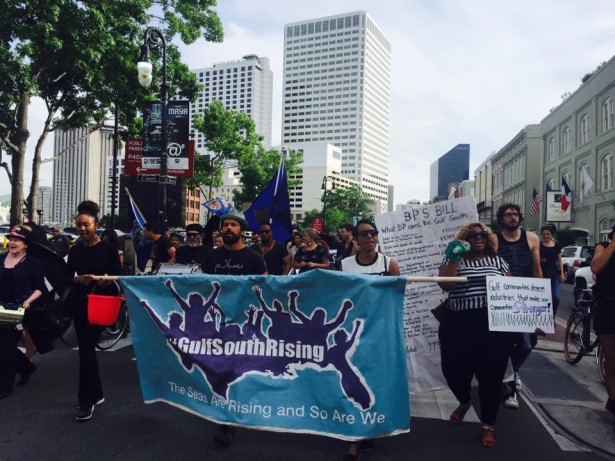
In light of looming environmental collapse, victories — for climate activists — can seem few and far between. But according to a study released by the Proceedings of the National Academy of Sciences this week, their efforts haven’t been for naught. Using data going back to 1990, the study’s results “indicate the potential of politics to ameliorate the effects of the scale of economic activity on the environment.” In simpler terms, activism is working.
While the report found that carbon emissions in “environmentally-friendly” states have dropped at a greater rate than those that harbor more climate deniers, it’s important to note that this finding isn’t based on the number of climate rallies or direct actions, but rather on the voting records of states’ congressmen and women, as rated by the League of Conservation Voters. Unsurprisingly, then, traditionally liberal-leaning enclaves like New York and California pulled ahead of extraction-heavy, largely conservative states such as Texas and West Virginia, when it came to reigning in CO2.
An author of the study, Michigan State University professor Thomas Dietz, told The Guardian, “If we increase environmentalism at the same scale as economic growth, we can offset the impact.” Sadly, the findings speak more to the geography of the fossil fuel industry and American politics than of organizers’ efforts, per say — or their success.
As much as we might wish there were a one-to-one relationship between advocacy and mitigation, that’s sadly not the case. When it comes to activism on climate, it’s not quantity, but quality that matters. Hundreds of thousands of people can gather around the country every so often, hold signs and say nothing in particular beyond “stop climate change.” A few might even don polar bear suits. The climate crisis, meanwhile, will continue unabated.
Activists in states like Louisiana and Arkansas face a considerably steeper uphill battle than their counterparts in blue states, in no small part because the oil corporations hold a bigger political sway in the places where they do business. Just because those states’ political elite remain — at least for now — un-phased by scientific consensus doesn’t mean that their states aren’t also powerful sites of resistance. An old union principle holds that the most vibrant, galvanizing fights come out of shops where organizers face the heaviest opposition: The same might well be said of climate change, not to mention those working with Gulf South Rising this summer and in the heart of Alberta’s tar sands country.
Despite the study’s flaws, there is a serious grain of truth to Dietz’s sentiment. As he said, “These things don’t just happen.” Well-planned, confrontational and strategic campaigns are likely the only mechanism to pull us out of full-blown catastrophe, and are already affecting a serious shift in Americans’ feelings on global warming. As Nation editor Katrina vanden Heuvel argued recently, everyone from Republican donors to Exxon Mobil are lining up behind the need for some sort of “climate action” (though the devil may well be in the details). Campaigns for fossil fuel divestment and against the Keystone XL pipeline have already begun to shift the political weather in the United States, if not, as of yet, the actual weather. Even the Pope is set to deliver a historic encyclical on the connection between global warming and poverty, leaked earlier this week. The impact of organizing against climate change may be hard to track in the atmosphere itself; for now, though, polls and headlines remain more trustworthy metrics of success.
